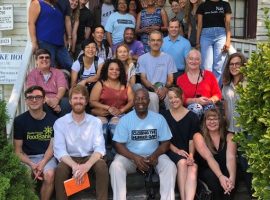Early this year, our ally La Via Campesina International organized its 3rd International Mission to Colombia to monitor the impacts of violence in rural communities caused by government forces and paramilitaries and learn from peasant and indigenous people what has to be done to achieve food sovereignty and justice.
The peace agreement between the Colombian State and the Revolutionary Armed Forces of Colombia – People’s Army (FARC-EP) has yet to be honored after the disbanding of FARC. In fact, in some places, the violence has skyrocketed after the peace agreement was signed in Cuba. It’s been reported that 837 community leaders, journalists, union organizers and politicians have been assassinated from January of 2016 to May of 2019. It is a staggering loss of 20 people per month.
In the report about the mission, translated by WhyHunger, La Via Campesina states:
“The signing of the Final Agreement constitutes a historical possibility to address the causes that initiated the social and armed conflict: the land problem, the restrictions in the political participation of the citizenship, and the misery and marginalization that the rural communities of the country have suffered. That’s why La Vía Campesina (LVC) celebrates the decision of the parties to take the first step in the path of building a more equitable, democratic and plural society, in which the full enjoyment of the rights of citizenship, fully assuming the responsibility born of the trust that the signatory parties have deposited in LVC by appointing them as an international accompanist in the implementation of Integral Rural Reform.”
WhyHunger supported La Via Campesina’s 3rd International Mission of La Via Campesina for the Observation and Monitoring of the implementation of the Peace Agreement in Colombia because we believe the conflict in Colombia is directly affecting peasants and indigenous people’s livelihoods and their rights to land and ancestral territories. La Via Campesina’s delegation was formed by 20 international delegates from 15 countries. The group of LVC members and allies visited the departments of Bogota, Cauca, Tolima and Cundinamarca. According to the report, the group met with peasant organizations, indigenous peoples and afro-descendant communities, government institutions, FARC ex-combatants, representatives of the Congress of the Republic, and embassies.
In conclusion, LVC’s 3rd International Mission found:
- The implementation of the agreements for the construction of a Peace with Social Justice is of the utmost importance to the people of Colombia. There is grave concern among peasant organizations, indigenous peoples and afro-descendant communities regarding the State’s non-compliance. Those with this concern are the main victims of the internal armed conflict in the country.
- The Peace Agreement has been almost entirely breached by the Colombian government, whom LVC considers to be obligated to implement. The Peace Agreement s not being implemented in the territories nor in public policies. There is an increase in criminalization, persecution and assassination of men and women who are social activists and community leaders, as well as of ex-combatants and their relatives, compared to what had been registered in LVC’s 2nd Mission in 2017. The aim of the current selective massacre appears to be to squash the defense of the territories and halt the peace agreement process.
- It is critical to call for a global international solidarity with Colombia, to denounce the systematic violation of human rights in the in the country before the international bodies.
We at WhyHunger congratulate our colleagues from peasant and indigenous organizations in Colombia and La Via Campesina International for this important initiative. We believe it’s critically important to stand in solidarity with those impacted by hunger, violence and oppression around the world and deeply value the role of social movements in amplifying the voices of and shining light on the realities of these communities in Colombia. We encourage our friends and supporters in the United States and around the globe to read the report.






